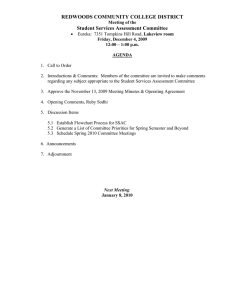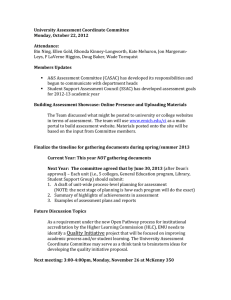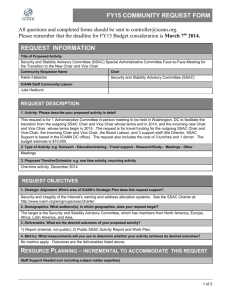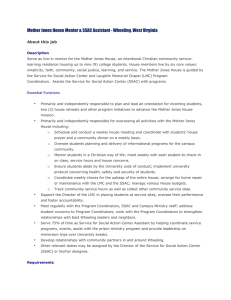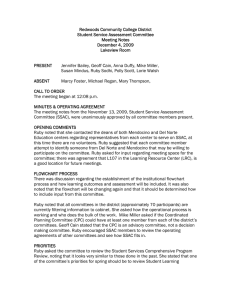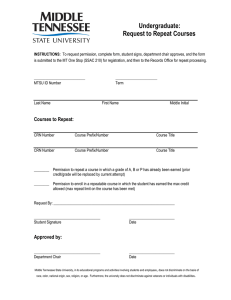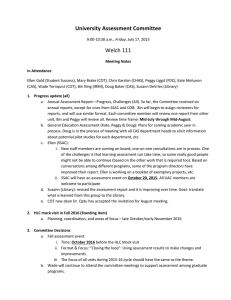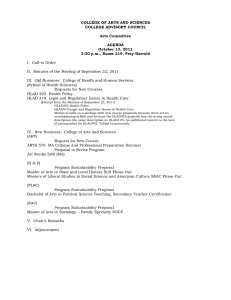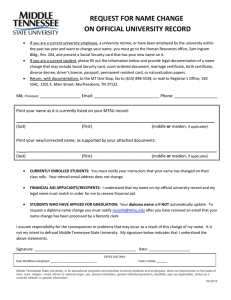S TATE
advertisement
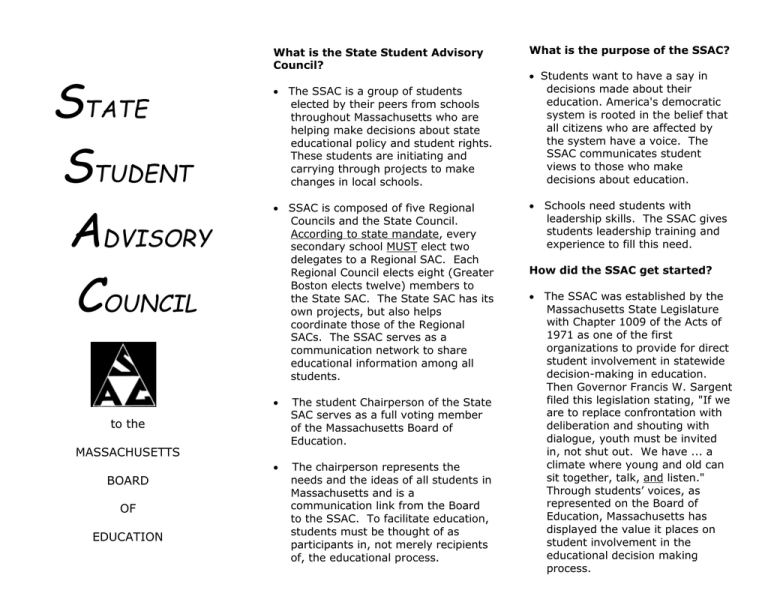
STATE STUDENT ADVISORY COUNCIL What is the State Student Advisory Council? The SSAC is a group of students elected by their peers from schools throughout Massachusetts who are helping make decisions about state educational policy and student rights. These students are initiating and carrying through projects to make changes in local schools. SSAC is composed of five Regional Councils and the State Council. According to state mandate, every secondary school MUST elect two delegates to a Regional SAC. Each Regional Council elects eight (Greater Boston elects twelve) members to the State SAC. The State SAC has its own projects, but also helps coordinate those of the Regional SACs. The SSAC serves as a communication network to share educational information among all students. The student Chairperson of the State SAC serves as a full voting member of the Massachusetts Board of Education. The chairperson represents the needs and the ideas of all students in Massachusetts and is a communication link from the Board to the SSAC. To facilitate education, students must be thought of as participants in, not merely recipients of, the educational process. to the MASSACHUSETTS BOARD OF EDUCATION What is the purpose of the SSAC? Students want to have a say in decisions made about their education. America's democratic system is rooted in the belief that all citizens who are affected by the system have a voice. The SSAC communicates student views to those who make decisions about education. Schools need students with leadership skills. The SSAC gives students leadership training and experience to fill this need. How did the SSAC get started? The SSAC was established by the Massachusetts State Legislature with Chapter 1009 of the Acts of 1971 as one of the first organizations to provide for direct student involvement in statewide decision-making in education. Then Governor Francis W. Sargent filed this legislation stating, "If we are to replace confrontation with deliberation and shouting with dialogue, youth must be invited in, not shut out. We have ... a climate where young and old can sit together, talk, and listen." Through students’ voices, as represented on the Board of Education, Massachusetts has displayed the value it places on student involvement in the educational decision making process. What has SSAC accomplished? In its 40+ years of existence, the SSAC has written, filed, & lobbied for passage of a number of laws that affect students. The most recent being the amendment to Chapter 622, the anti-discrimination law that protects students based on race, sex, religion, color, national origin, to also include sexual orientation. Other SSAC sponsored and enacted legislation has included C.71, S.13 Curriculum Innovation (right to petition for a course); C.71, S.38M Student Advisory Committee to School Committees; C.71, S.82-85 Student Bill of Rights (freedom of expression, rights as to personal dress, discipline, regulations). SSAC has also lent its support to legislation regarding busing to desegregate schools, the gay rights bill, sexual harassment protection and violence prevention education. SSAC has proven that students can have an impact on education. Through group decision-making, students decide the structure, goals, & activities of their councils. SSAC has served as the model for other states and organizations that want to actively involve students. They see SSAC as a pioneering and powerful ally. SSAC has produced documents to provide students with ideas and resources to help them as active participants in the democratic process. These documents include Check It Out: A Student Guide to Rights and Responsibilities; Student Guide to Special Education; Do You Want Condoms Available in Your Schools? SSAC has also lent its support to the creators of: Working With Your School Committee: A Student Guide; The Student's Guide to Lobbying; Leading the Way: A Handbook for Student Government Officers; and A Guide in Reviewing Student Handbooks. These documents have also provided adults working with youth an opportunity to actively engage students in the decision-making process. SSAC has sponsored conferences and workshops for students addressing such issues as student rights and responsibilities, biases, and Education Reform; organized speak outs and rallies urging passage of Education Reform and the law to prohibit discrimination against students (C.622); as well as producing a public service announcement addressing diversity. SSAC members have participated in deliberations, as equal partners with adults, regarding the development of the Education Reform Act, the Common Core of Learning, the Curriculum Frameworks, and the recommendations on Time & Learning. SSAC members have also participated in the committees established to search for the Commissioner of Education as well as the selection committees for Teacher of the Year, the U.S. Senate Youth Program and the Christa McAuliffe Fellowship. How can interested people receive more information about the Student Advisory Council? Write or call: Donna Taylor Student Advisory Council Massachusetts Dept. of Education 75 Pleasant Street Malden, MA 02148 dtaylor@doe.mass.edu (781) 338-6320
